If you’re looking for the best business plan template books, I recommend checking out a mix of guides that cover quick launches, detailed templates, and step-by-step instructions. Titles like the 24 Hour Business Plan, all-inclusive guides on writing winning plans, and beginner-friendly resources with fill-in-the-blank templates can help you get started confidently. Keep exploring, and you’ll find the perfect tools to turn your idea into a thriving business.
Key Takeaways
- Highlights top books offering comprehensive business plan templates for new entrepreneurs.
- Focuses on resources that simplify planning and increase chances of successful business launches.
- Includes guides suitable for beginners and experienced entrepreneurs alike.
- Emphasizes practical tools, step-by-step instructions, and real-world examples.
- Aims to help readers choose effective books to craft compelling, actionable business plans.
24 Hour Business Plan Template
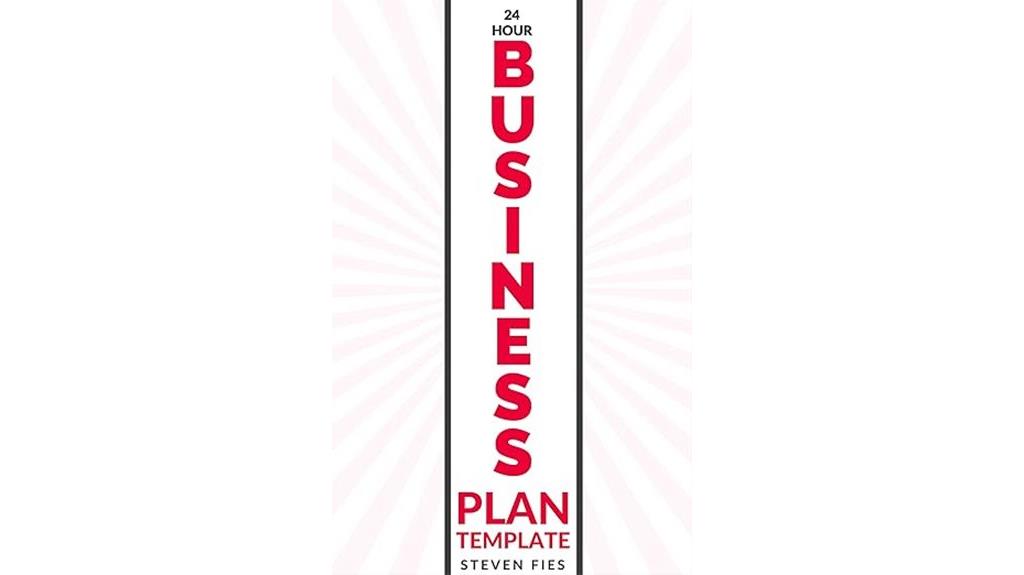
Are you looking for a business plan template that helps you move quickly from idea to action? The “24 Hour Business Plan Template” by Steven Fies is perfect for that. It’s designed to get you up and running fast, focusing on essential steps to test your ideas and launch confidently within a day. I love how it simplifies complex planning, encouraging you to avoid overthinking and wasted time. Instead, it emphasizes rapid feedback and actionable tasks. Whether you’re a beginner or a creative professional, this approach keeps you moving forward without getting bogged down in details. It’s an efficient way to turn your vision into reality quickly.
Best For: entrepreneurs, creative professionals, and beginners seeking a quick, practical approach to launching a business within 24 hours.
Pros:
- Simplifies complex business planning into an easy, actionable process
- Encourages rapid feedback and testing to reduce risk
- Suitable for beginners and those with limited time or experience
Cons:
- Lacks detailed case studies or real-world examples for deeper learning
- Some users may encounter issues downloading supplementary templates
- May oversimplify certain aspects of business planning for more complex ventures
Business Plan Template and Example
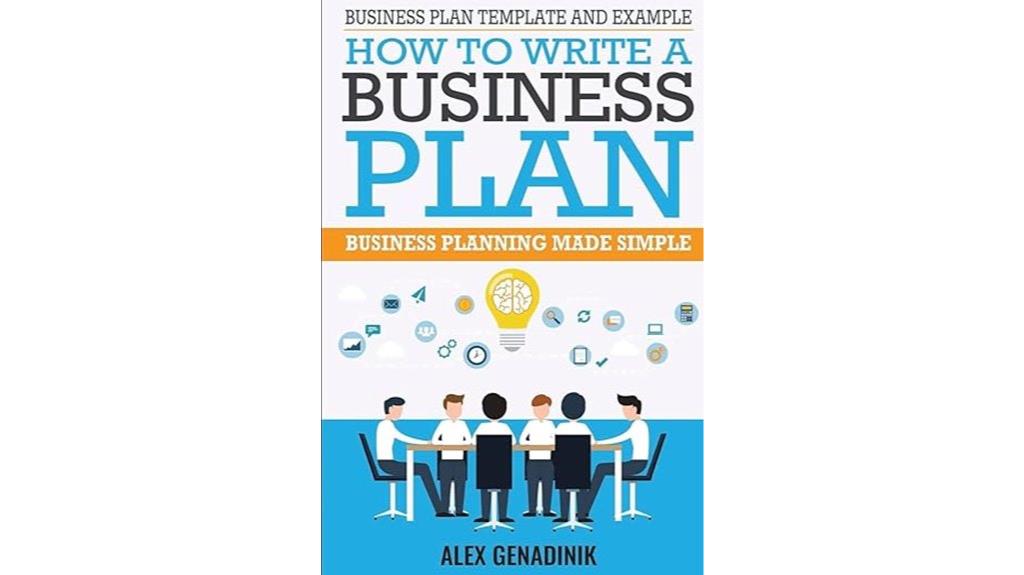
If you’re new to business planning or need a straightforward guide to develop a solid plan, “Business Plan Template and Example” is an excellent resource. This book simplifies the process with a clear 9-chapter structure, guiding you from a brief three-sentence proposal to a detailed plan covering finance, marketing, and growth strategies. It offers step-by-step instructions, real-world examples, and downloadable resources like videos and templates. Designed for beginners and those needing a refresher, it makes business planning accessible, demystifying complex concepts, and boosting your confidence to start and grow your business effectively.
Best For: beginners and aspiring entrepreneurs seeking a clear, straightforward guide to develop a comprehensive business plan with minimal prior experience.
Pros:
- Simplifies complex business planning concepts with easy-to-follow steps and examples
- Provides valuable downloadable resources like templates and videos for practical application
- Boosts confidence and clarity, making it accessible for first-time entrepreneurs or small business owners
Cons:
- Some readers find the focus on the author’s own businesses distracting or self-promotional
- Limited depth in personalized coaching or advanced business strategies without paid support
- May lack extensive coverage on niche topics such as building within existing companies or deeper marketing tactics
Business Plan Template with MS Word and Excel Files

The Business Plan Template with MS Word and Excel Files stands out as the ideal choice for beginners who want a straightforward, structured way to develop their business plans. It offers a complete fill-in-the-blank format, along with spreadsheets and nine free gifts, making it easy to organize ideas and financial projections. Users find it helpful for overcoming initial inertia and understanding key business components. While some note limitations like less customization space and overlapping free resources, many appreciate its clarity and practical guidance. Overall, it’s a solid starting point for those seeking an organized, beginner-friendly tool to launch their business confidently.
Best For: beginners seeking a clear, structured, and easy-to-use business plan template to efficiently develop their business ideas and financial projections.
Pros:
- Provides a complete fill-in-the-blank format for quick and straightforward planning
- Includes helpful explanations that guide users through essential business components
- Facilitates overcoming initial inertia and developing a solid foundation for business development
Cons:
- Offers limited space for customization and personalization of the plan
- Overlaps with free online resources, which may reduce its uniqueness and value
- Some versions, like the Audible, have technical issues such as poor audio quality and broken links
How to Write a Winning Business Plan: A Step-by-Step Guide for Entrepreneurs
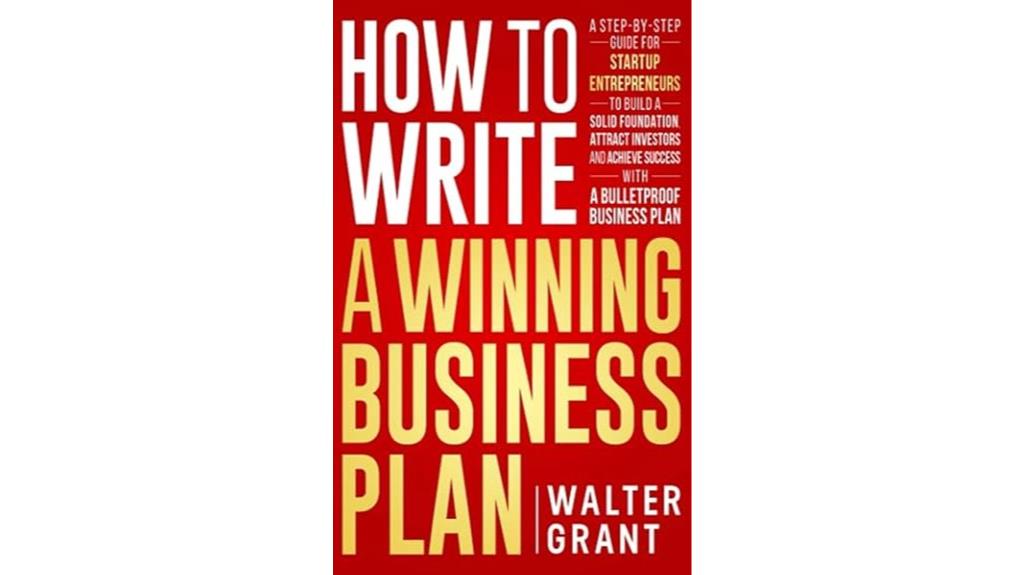
For entrepreneurs seeking a clear, structured approach to crafting a winning business plan, the best books on business plan templates serve as invaluable guides. These resources walk you through each step—from defining your business purpose to analyzing industry dynamics. They emphasize setting realistic goals, understanding your market, and preparing contingency plans for challenges. Using practical frameworks like the Business Model Canvas and detailed questions, these books help you develop clarity and focus. Ultimately, they provide the tools and insights needed to create a compelling plan that attracts investors, guides operations, and sets you on a path to success.
Best For: aspiring entrepreneurs and small business owners seeking a comprehensive, step-by-step guide to developing effective business plans using practical frameworks and templates.
Pros:
- Provides clear, structured guidance that simplifies complex planning processes
- Includes valuable tools like the Business Model Canvas and real-world questions for clarity
- Emphasizes setting realistic goals, understanding industry dynamics, and preparing contingency plans
Cons:
- May require additional research or resources for in-depth industry analysis
- Some entrepreneurs might find the step-by-step approach too rigid for their unique business models
- The focus on templates and frameworks might overlook the need for personalized strategic insights
How to Write a Business Plan with No Experience: A Simple Guide
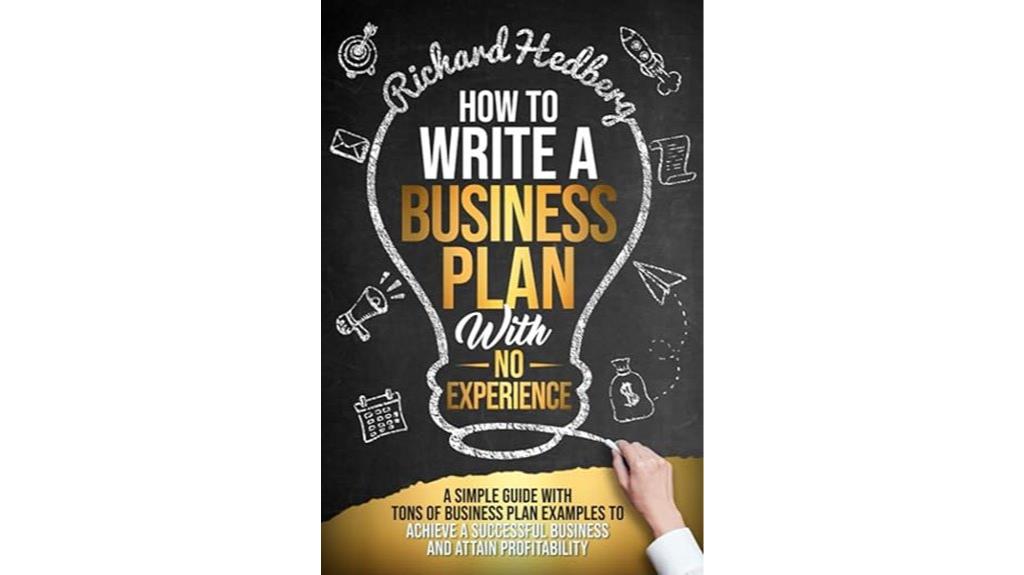
Wondering how to craft a solid business plan without any prior experience? “How to Write a Business Plan With No Experience” is an ideal starting point for beginners who feel overwhelmed by the process. This guide simplifies complex concepts into clear, easy-to-understand steps, making planning accessible for newcomers. It provides practical advice, sample plans, and a step-by-step approach that builds confidence and clarity. Many readers have credited it with helping them shape ideas, clarify goals, and avoid common mistakes. Overall, it’s a practical, motivating resource that turns intimidating planning into a manageable task, even for those with zero prior knowledge.
Best For: beginners and aspiring entrepreneurs who feel overwhelmed by business planning and need a clear, simple guide to get started.
Pros:
- Simplifies complex business concepts into easy-to-understand steps.
- Provides practical examples and sample plans to build confidence.
- Highly recommended for newcomers, offering a step-by-step approach to crafting effective business plans.
Cons:
- May lack detailed guidance on market research and in-depth analysis.
- Some readers wish for more advanced strategies for post-planning steps.
- Might oversimplify certain topics for those seeking comprehensive technical details.
Marketing Plan Template & Example

If you’re new to marketing or need a straightforward way to craft an effective marketing plan, this book is an excellent starting point. It offers a clear, structured methodology that emphasizes key points without unnecessary filler. With practical tips, step-by-step guidance, and real-world examples, I found it helpful for visualizing how to build my plan. The templates provided made it easier to organize my ideas and stay focused. While some might find it basic or lacking industry-specific insights, I appreciated its simplicity and practical approach, especially if you’re short on time or marketing experience. It boosted my confidence in creating a solid marketing strategy.
Best For: beginners, entrepreneurs, and marketers seeking a straightforward, easy-to-follow guide to developing effective marketing plans.
Pros:
- Provides a clear, structured methodology that emphasizes key points.
- Includes practical tips, step-by-step guidance, and real-world examples to aid understanding.
- Offers templates that help organize ideas and boost confidence in creating marketing strategies.
Cons:
- May be considered too basic or lacking in industry-specific insights.
- Lacks deep, advanced strategies or detailed guidance on budgeting and engaging C-level executives.
- Some users find the content resembles online information without much originality or depth.
Beautiful Meeting Notebook for Work Organization

The Beautiful Meeting Notebook stands out as an essential tool for busy professionals who need to stay organized and efficient during meetings. With 150 pages in a sleek 7×10-inch size, it provides plenty of space for agendas, notes, action items, and due dates, helping you keep everything in one place. Its stylish pink-apricot color, gold foil lettering, and durable design make it both functional and elegant. Whether you’re an executive, assistant, or teacher, this notebook simplifies note-taking and keeps you on track. Its thoughtful layout enhances productivity, ensuring you capture key points clearly and stay prepared for every meeting.
Best For: professionals such as executives, assistants, teachers, and anyone who needs an elegant, organized, and durable notebook for meeting documentation and work planning.
Pros:
- Stylish design with a sleek pink-apricot color and gold foil accents enhances professionalism and elegance.
- Ample space with 150 pages in a 7×10-inch size allows for comprehensive note-taking and agenda tracking.
- Durable premium paper cover ensures longevity for daily use in busy work environments.
Cons:
- The size may be too large for those preferring compact notebooks for on-the-go use.
- Limited to a single color option (pink-apricot), which may not suit all preferences.
- No additional organizational features like tabs or dividers for categorization.
Guide to Starting Your Own Business: Step-by-Step Book with Templates and Checklists
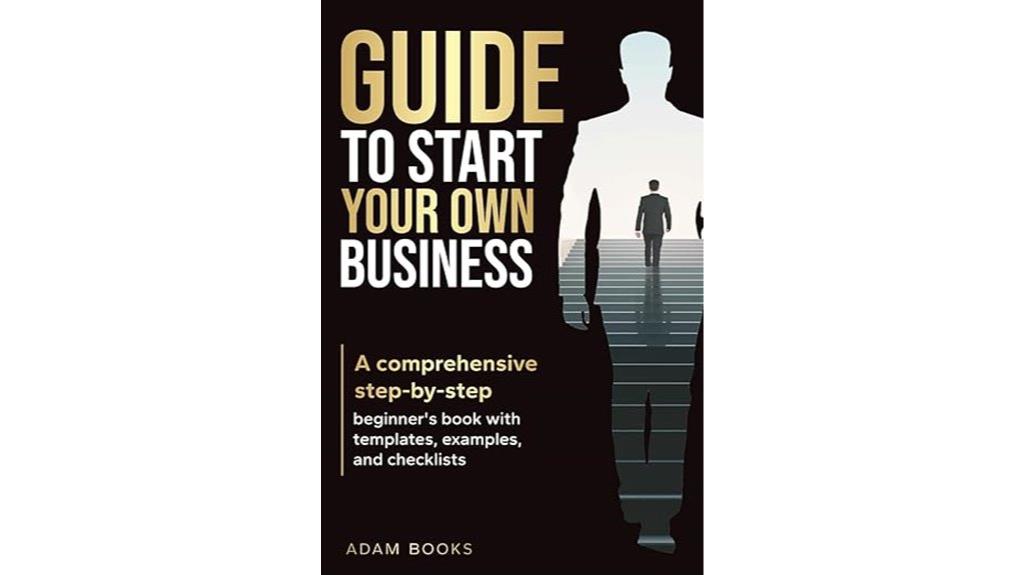
This extensive guide is an ideal choice for aspiring entrepreneurs who want a clear, practical roadmap to launching their business. It walks you through every step, from brainstorming ideas and choosing the right model to registering your business and setting up operations. The book is straightforward, avoiding jargon and complex theories, making it perfect for beginners. It offers detailed legal, financial, branding, and operational insights, along with real-world examples. Plus, it includes templates and checklists to keep you organized and confident. With this guide, you’ll feel prepared to take actionable steps and build a strong foundation for your business success.
Best For: aspiring entrepreneurs, beginners, and side hustlers seeking a straightforward, practical guide to start and grow their business with confidence.
Pros:
- Provides step-by-step instructions with templates and checklists to stay organized.
- Uses clear, jargon-free language, making complex topics accessible for beginners.
- Includes real-world examples and success stories to inspire and guide progress.
Cons:
- May lack in-depth coverage of advanced or niche business topics.
- Some templates might require customization to fit specific business models.
- Less emphasis on digital marketing strategies or online business specifics.
Business Plan Writing Guide
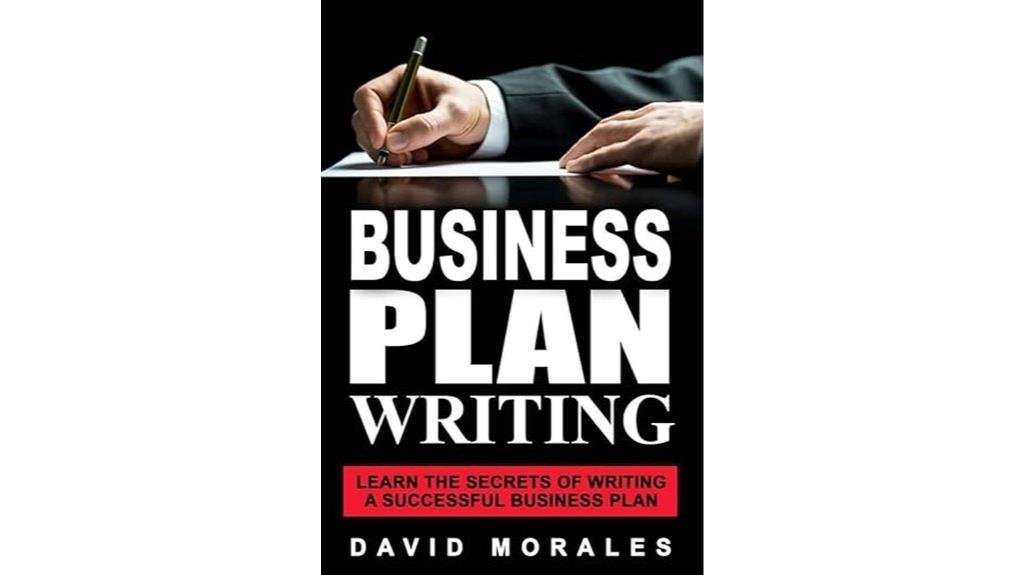
Are you looking for a straightforward guide to craft a clear and professional business plan? I’ve found that a good business plan writing guide offers simple descriptions of different plan types and templates, making it easy for beginners to understand quickly. It shares effective strategies, tips, and secrets to boost your plan’s clarity and impact. The guide breaks down key sections like the executive summary, market analysis, and financial projections, helping you organize your content logically. Plus, it recommends useful resources such as books and sample letters. Overall, it’s an efficient tool for gaining essential planning skills and building a solid business plan.
Best For: beginners and entrepreneurs seeking a simple, clear, and effective guide to craft professional business plans quickly.
Pros:
- Provides straightforward descriptions and templates suitable for beginners
- Offers effective strategies and tips to enhance plan clarity and impact
- Includes recommended resources like books and sample letters for further learning
Cons:
- May lack in-depth detail for advanced or complex business plans
- Some users desire more comprehensive sample letters and detailed examples
- Might not cover niche or industry-specific planning needs in depth
Starting a Business QuickStart Guide
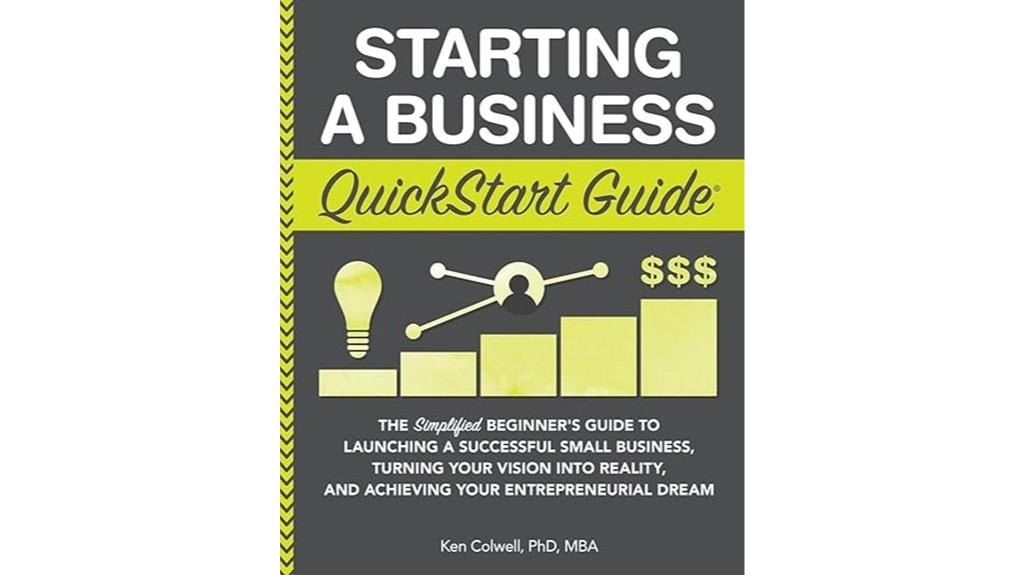
If you’re new to entrepreneurship or planning a small online venture, Starting a Business QuickStart Guide offers a practical, step-by-step approach to simplify the process. Designed for beginners, it breaks down complex concepts into clear, actionable steps, making business setup less intimidating. The book covers essential topics like designing, planning, and writing a thorough business plan, with straightforward instructions and real-world insights. Its well-structured format includes digital resources to support your goals and boost confidence. Many users praise its engaging, easy-to-understand style, finding it a valuable tool to kickstart their ventures, especially when time or experience is limited.
Best For: beginner entrepreneurs, aspiring small online business owners, and students seeking a straightforward, practical guide to start their business confidently.
Pros:
- Simplifies complex concepts into easy-to-follow steps, making entrepreneurship accessible for beginners.
- Includes practical, real-world insights and digital resources to support goal achievement.
- Well-structured and engaging, helping users feel confident and motivated to launch their ventures.
Cons:
- May lack in-depth coverage of advanced business topics for experienced entrepreneurs.
- Focused primarily on small and online ventures, limiting applicability for larger or traditional businesses.
- Some users might find the step-by-step instructions too basic if they already have some business knowledge.
How to Write a Business Plan with No Experience Guide
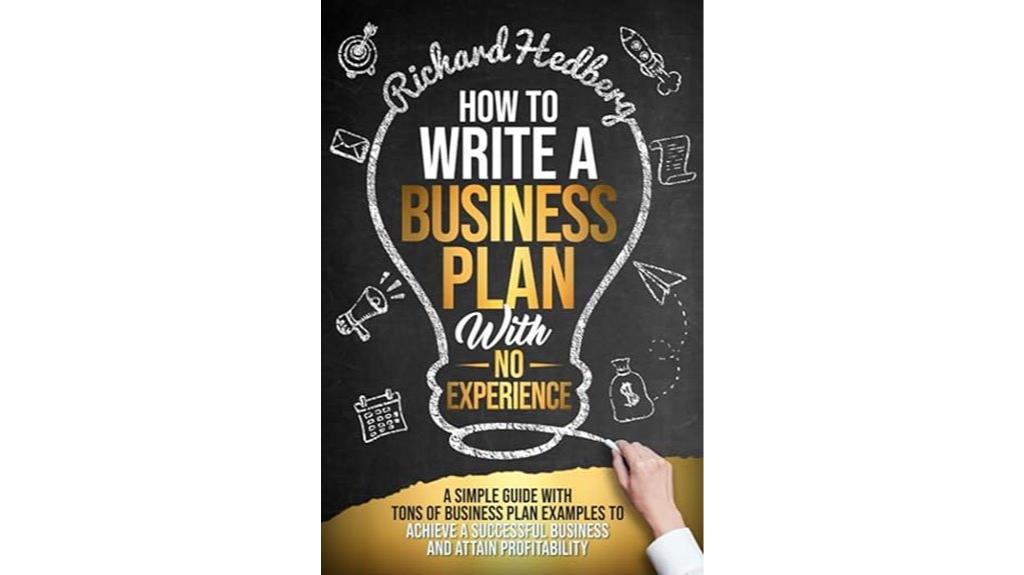
For aspiring entrepreneurs with no prior experience, “How to Write a Business Plan With No Experience” stands out as an essential resource. It simplifies complex concepts into clear, manageable steps, making the process less intimidating. The book offers practical guidance, sample plans, and straightforward language that build confidence and understanding. Readers praise its organized structure and real-world examples, which help clarify goals, shape ideas, and avoid common mistakes. While it doesn’t cover every detail, it provides a solid foundation for beginners to craft effective plans, attract investors, and set their businesses on a path to success.
Best For: beginners and aspiring entrepreneurs with no prior experience seeking a clear, straightforward guide to business planning.
Pros:
- Simplifies complex business concepts into easy-to-understand steps
- Offers practical examples and sample plans to build confidence
- Well-organized and concise, making it accessible for newcomers
Cons:
- May lack detailed guidance on market research and in-depth analysis
- Focuses more on foundational planning rather than advanced strategies
- Some readers might need additional resources for specific topics or next steps
Factors to Consider When Choosing Business Plan Template Books

When selecting a business plan template book, I focus on how clear and straightforward the content is to understand. I also consider whether it offers practical tools and templates I can actually use, along with how easy it is to navigate visually. Ultimately, I want a resource that’s user-friendly and packed with useful features to guide my planning process effectively.
Clarity of Content
Choosing a business plan template book with clear content makes a significant difference in how easily I can understand and apply the information. I look for books that present ideas in a logical, organized way, with distinct sections and helpful headings. Simple language is essential—avoiding jargon guarantees I grasp concepts without frustration. Visual aids like diagrams, templates, and step-by-step guides boost my understanding and make complex topics easier to digest. Concise explanations without unnecessary details help me stay focused and prevent overwhelm, especially as a beginner. When the content is straightforward and well-structured, I can quickly find what I need and confidently put the advice into practice. Clear content truly makes the process of creating a business plan more manageable and less intimidating.
Practical Application Focus
Ever wondered what makes a business plan template book truly practical? It’s all about how easily you can apply what you learn. Look for books with clear templates, step-by-step instructions, and real-world examples that help you act immediately. Resources emphasizing actionable strategies and scenarios make translating concepts into actual business steps smoother. Downloadable or customizable templates are a huge plus—they save time and keep your plan consistent. Simplicity and clarity are essential, especially if you’re new to business planning, so choose guides that break down complex ideas into manageable parts. Additionally, check for worksheets, checklists, or exercises that reinforce learning through active participation. These features ensure you’re not just reading but actively building a solid, practical business plan you can implement confidently.
User-Friendliness Level
A user-friendly business plan template book makes the planning process much smoother, especially for beginners. I look for books with clear, simple language that’s easy to understand without prior experience. Step-by-step instructions, templates, and visual aids help me grasp concepts quickly and apply them effectively. Well-organized chapters that follow a logical progression make wayfinding the content more straightforward. I also appreciate books that minimize jargon and include practical examples, making the material accessible to a broad audience. Additionally, supplementary resources like downloadable templates and checklists enhance usability and save time. Overall, a high level of user-friendliness ensures I can focus on developing my business plan confidently, without getting lost in complex language or disorganized content.
Visual and Layout Design
When evaluating business plan template books, paying attention to visual and layout design can make a significant difference in how smoothly I can develop my plan. A well-organized layout helps me quickly locate and understand key sections, saving time and reducing confusion. Clear headings, subheadings, and consistent formatting improve readability and keep me focused. Visual elements like charts, tables, and infographics make data easier to interpret and present convincingly. An aesthetically pleasing design with balanced white space prevents the pages from feeling cluttered, keeping me engaged. Additionally, templates that include step-by-step visual guides or checklists streamline the process, ensuring I don’t miss critical components. Overall, a thoughtful visual and layout design enhances clarity, efficiency, and confidence throughout my planning journey.
Resource and Template Inclusion
How do you determine if a business plan template book offers practical value? First, check if it includes downloadable or fillable templates in formats like Word or Excel, making customization easy. Next, see if it provides thorough examples or sample plans across different industries and business models to guide you effectively. Look for books that feature step-by-step instructions, checklists, or worksheets to help you develop each section systematically. Also, verify if it offers additional tools such as financial projection spreadsheets, marketing plan outlines, or operational templates for a complete planning process. Lastly, consider whether the resource includes supplementary materials like videos, online support, or links to external templates, all of which can enhance practical application and success.
Industry Specificity
Ever wondered why industry-specific business plan books often produce better results? It’s because they tailor content and examples to address the unique challenges, regulations, and market dynamics of particular sectors. These books include specialized sections on industry-specific financial metrics, compliance requirements, and operational strategies that generic templates usually overlook. Choosing a sector-focused plan helps you demonstrate industry knowledge, boosting your credibility with investors and stakeholders. Additionally, these books feature tailored marketing strategies, customer segmentation, and competitive analysis relevant to your industry. Using an industry-specific template increases the chances of creating a detailed, realistic plan that aligns with sector standards and expectations. This targeted approach makes your business plan more actionable and appealing, ultimately setting you up for a stronger launch and sustained success.
Author Credibility
Choosing the right business plan template book starts with evaluating the author’s credibility. I look at their professional background, industry experience, and whether they’ve published work related to business planning. Authors with a successful entrepreneurial or consulting track record usually offer more practical, reliable advice. Recognized experts or thought leaders often have credentials, awards, or peer endorsements that confirm their expertise. I also check if they actively engage with their audience through social media, forums, or coaching—this shows they’re committed to sharing knowledge and staying current. Positive reviews, testimonials, and endorsements from reputable sources can further validate an author’s authority. Ultimately, selecting a book authored by a credible, experienced, and well-regarded expert increases my confidence that the guidance inside will be valuable for my business journey.
Frequently Asked Questions
How Do I Choose the Best Business Plan Template for My Industry?
Choosing the right business plan template starts with understanding my industry’s unique needs. I look for templates tailored to my sector, whether it’s tech, retail, or service-based. I consider clarity, flexibility, and whether it covers industry-specific sections like market analysis or operations. I also read reviews or ask peers for recommendations. This helps me pick a template that’s practical, all-encompassing, and aligns with my business goals.
Can These Books Help With Securing Funding or Investor Interest?
Did you know that 80% of startups fail due to lack of funding? These books can definitely help you craft a compelling business plan that attracts investors. They teach you how to highlight your unique value proposition, financial projections, and market strategy. By following their guidance, you’ll improve your chances of securing funding and gaining investor interest. A solid plan is your first step toward turning your vision into reality.
Are There Templates Tailored for Online or E-Commerce Businesses?
You’re wondering if there are templates specifically designed for online or e-commerce businesses. I’ve found that many business plan books include tailored templates for digital ventures, focusing on aspects like online marketing, platform development, and e-commerce logistics. These templates help you clearly outline your online strategy, target market, and revenue model, making it easier to plan and present your e-commerce idea confidently to investors or partners.
How Often Should I Update My Business Plan Using These Templates?
I update my business plan whenever there’s a significant change in my goals, market conditions, or financial situation—usually every 6 to 12 months. Regular updates help me stay on track and adapt to new opportunities or challenges. I also review it whenever I launch a new product or service. Keeping it current guarantees I’m always aligned with my business’s growth and evolving landscape.
Do These Books Include Case Studies or Real-Life Examples?
You’re wondering if these books include case studies or real-life examples. From my experience, many of these books do feature practical case studies to illustrate key concepts. They help you see how successful entrepreneurs crafted their plans and overcame challenges. I find that real-life examples make the material more relatable and easier to apply. So, if you’re looking for inspiration and practical insights, these books are definitely worth checking out.
Conclusion
If you’re serious about launching your dream business, these books are your secret weapons—like having a personal business guru in your pocket! They’ll turn your chaos into clarity, your doubts into a killer plan, and make the mountain of startup stress feel like a gentle hill. Trust me, with the right guide, you’ll be launching like a pro in no time—so don’t wait, your empire starts here!










